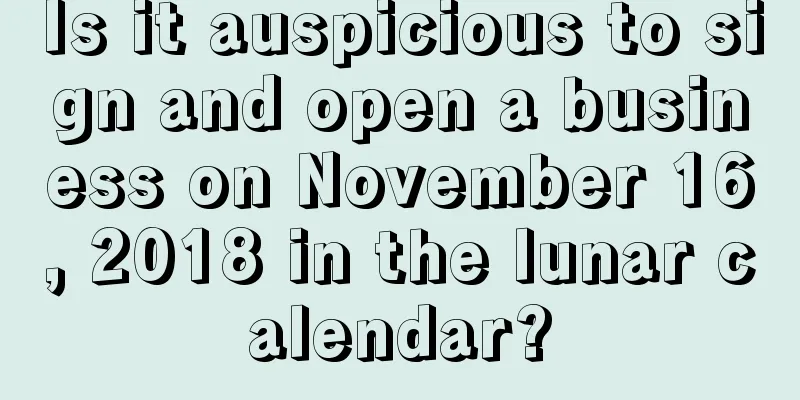What are the customs on February 2nd? Introduction to the traditional customs of Dragon Raising its Head

The customs and habits of different festivals are also different. So, let’s take a look at what customs are there on February 2nd? Introduction to the traditional customs of the Dragon Raising its Head. "Flowers bloom in February", the second month of the lunar calendar is also called the Apricot Month. For auspicious and inauspicious analysis of matters related to marriage, moving, signing contracts, etc., please visit the special column of February 2021 of the lunar calendar on Shuimoxiansheng.com!What are the customs on February 2nd? Introduction to the traditional customs of Dragon Raising its HeadCustom 1: Offering sacrifices to the community godsFebruary 2 is both the Dragon Raising Head Festival and the birthday of the God of Land. The "Birthday of the God of Land" is also called the "Community Day Festival." Custom 2: Eating dragon food There are certain dietary requirements on the second day of the second lunar month. People in the north often eat food named after dragons on this day. Eating spring pancakes is called "eating dragon scales", eating noodles is called "eating dragon whiskers", eating wontons is called "eating dragon eyes", eating dumplings is called "eating dragon ears", cooking noodles and wontons together is called "dragon pearls", and eating scallion pancakes is called "tearing dragon skin". In some places, there is also the custom of eating "dragon eyes", "dragon whiskers", "dragon tongue", "dragon ears", "dragon skin", "dragon seeds", "dragon eggs", as well as spring pancakes and pig heads. Custom 3: Collecting Dragon Qi In the morning at Mao time (between 5 and 7 o'clock), on the first Mao day of Mao month, go out, face east and take a deep breath, this is auspicious. Custom 4: Shaving the dragon head It refers to haircutting on the second day of the second lunar month. For children, haircut is called "shaving a happy head". It takes advantage of the auspicious time of the dragon raising its head to bless the children to grow up healthily and become successful when they grow up. For adults, haircut is to bid farewell to the old and welcome the new, hoping to bring good luck and smooth sailing in the new year. Custom 5: Dragon Boat Rally In ancient times, the Dragon Head-raising Festival was a day for worshiping the Dragon God. On this day every year, people would go to the Dragon God Temple or the waterside to burn incense and offer sacrifices to the Dragon God, praying for the Dragon God to create clouds and rain and bless a good harvest for the year. Custom 6: Using oxen to plow "Dragon Raising its Head" is also an agricultural festival in rural areas. An agricultural proverb says: "On the second day of the second month, the dragon raises its head, and households of all kinds use oxen to plow." Spring rain in the farming season is as precious as oil. If there is abundant spring rain, it indicates a good harvest in the year. Custom 7: Release the Dragon Lantern There is also a custom of "releasing dragon lanterns" in the Yellow River Delta and some riverside areas. Custom 8: Knocking on the dragon head In some parts of Northeast China, people use long poles to hit the roof beams on the morning of February 2, which is called "knocking the dragon's head." Wake up the dragon and bring peace to the area. What does the dragon raising its head mean?Dragon Raising its Head is the name given to the solar term by ancient people. Dragon Raising its Head represents the arrival of spring, the revival of all things, and indicates that a year's farming activities are about to begin. In the north, February 2 is also called the Dragon Raising its Head Day, or the Spring Dragon Festival. In the south, the Dragon Raising its Head Festival is also called the Outing Festival.There is a saying among the Chinese people on the second day of the second month of the lunar calendar: "On the second day of the second month, the dragon raises its head." It means that spring is coming, all things revive, and hibernating dragons begin to move, foreshadowing that a year's farming activities are about to begin. In the north, February 2 is also called the Dragon Raising its Head Day, or the Spring Dragon Festival. In the south it is called the Outing Festival, and in ancient times it was called the Picking Vegetables Festival. The Chinese have had the custom of "February 2" since the Tang Dynasty. According to historical records, the origin of this sentence is related to ancient astronomy's understanding of the movement of stars and agricultural solar terms. "On the second day of the second month, the dragon raises its head" is probably the most popular saying about "on the second day of the second month". What does “Dragon Raising its Head” mean? If we trace the earliest origin of this sentence, it should be related to the ancients' understanding of the movement of stars. |
Recommend
Is it a good idea to worship ancestors on the 15th day of the eighth lunar month in 2018? How is today's time?
Sacrifice is a ritual people perform for their anc...
Is it appropriate to have a caesarean section on November 24, 2021 in the lunar calendar? What should I pay attention to after cesarean section?
With the arrival of the howling north wind in the ...
Is the summer solstice the day with the longest day? Where is the longest day?
The summer solstice is one of the 24 solar terms i...
Is August 22nd of the lunar calendar in 2021 an auspicious day? Is it suitable for caesarean section?
Each season is divided into three months: Meng, Zh...
Is the seventh day of the fourth lunar month in 2018 a good date in the lunar calendar? Is it suitable for starting renovations?
Introduction: Generally, an auspicious day must be...
Is Laba Festival in the lunar calendar of 2018 a good day for marriage? Taboos on marriage during Laba Festival
In ancient times, Laba Festival was a day to worsh...
What zodiac sign does a baby born on the fifth day of the seventh lunar month in 2017 belong to?
Introduction: The study of numerology is a broad a...
Which direction is best for a residential living room? Is your family member successful in his or her career?
Introduction: The living room is an important pla...
Is March 17th of the lunar calendar in 2019 an auspicious day for a haircut? What does it mean to shave your head?
Introduction: Sometimes you need to choose an ausp...
A list of auspicious days for getting married in the first month of the Year of the Pig 2019!
Getting married is a happy event and one of the mo...
Is it okay to pray on the 29th day of the seventh lunar month in 2018? What is the meaning of burning incense?
Burning incense and praying for blessings is one o...
What day of the week is New Year’s Eve 2018? What are the taboos to pay attention to during New Year’s Eve?
Introduction: Time passes by bit by bit in the bli...
Can children go out at night during the Ghost Festival? What should we pay attention to when going out at night during the Ghost Festival?
According to folklore, the Ghost Festival is the t...
What zodiac sign does November 21, 2020 belong to?
What zodiac sign does November 21, 2020 belong to?...
Is October 27th of the lunar calendar in 2020 a suitable day for worshiping ancestors?
Is October 27th of the lunar calendar in 2020 a su...









